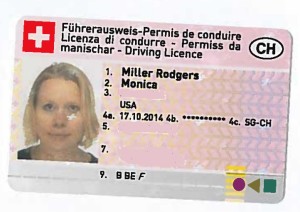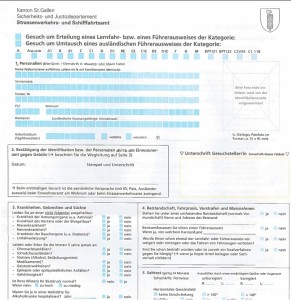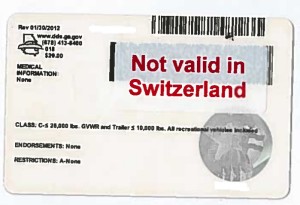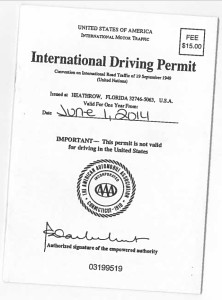
Beware Swiss drivers: I’m an official licensed driver now!
No more visitor’s passes, Chris and I are now the proud holders of Swiss driver’s licenses. We’ll be driving in Switzerland legally now.
How to obtain a Swiss driver’s license
Not to say we were illegally driving before, but we only had an International Driving Permit, which you can easily pick up at any AAA for a minimal fee (usually around $15), a passport-size photo and proof of a valid local driver’s license.
Now, though, we have the real deal, including a sticker on our U.S. driver’s license that says “Not valid in Switzerland.”
To obtain this coveted certificate, we had quite a bit of paperwork to fill out, but, thankfully, no driver’s test was required.
We had to visit the local city government offices to obtain the correct form. Completely in German, we had to have some help deciphering it all, but it was a straightforward form you could expect from the Department of Motor Vehicles in the States.
The form required an attached passport-sized photo, your current American or other country driver’s license and a signed-off eye exam by a certified optometrist.
And this is where it go fun.
“You will never drive in Switzerland!”
Unlike in the States, eye exams are not done at the local government establishment where you are issued your driver’s license. You must go to a licensed provider, which can be found either at an eye doctor or at shops that sell glasses, like LensCrafters. There is one of these shops around the corner from where we live, so we decided to try there first.

An older gentlemen owns the store, and he has an old-fashioned eye exam room in the back. You sit in the chair and he places one of those bulky lens on a swivel in front of you. He flips through the different lenses requiring you to call out the lines of letters.
The strange part, at least for me as I’d never experienced it before, was the lines of letters were not in front of you. They were behind you in backward form projected onto a mirror in front of you. So, you’re looking at a line of letter images on a mirror.
I know my eyesight is no longer the best. That’s what staring at a computer screen for 10+ hours a day gets you. At my last optometrist appointment in the States I was told I had a slight astigmatism but it wasn’t bad enough, yet, to do anything about. So, I was already a bit nervous about the eye exam, and then when I realized the mirror stunt, I was even more uncomfortable.
Needless to say, I failed this eye exam with flying colors, and you would have thought I had shredded and set the Swiss flag on fire by the way the old man reacted. He literally began yelling at me that I would never drive in Switzerland. Then he asked me if I had a car. When I told him no, he was visibly disappointed as he told me that if I did, he was going to call the police on me to confiscate the car.
Next up in the chair of torture was Chris. He passed, but only at 80 percent. Though the old man was much nicer to him, he still seemed upset he had to pass Chris at 80 percent. Before we left the store, he made sure he reminded me that I was not or would I ever be legally allowed to drive in the country.
Never take no as the answer to driving in Switzerland
Feeling pretty down about the whole situation, I wasn’t quite ready to give up yet. I decided to try one other shop nearby. What a difference some updated technology can make.
When I walked into the shop, I was greeted by a pleasant lady that led me directly upstairs to a modern telescope piece of equipment. I was to look into the device and read the lines of letters directly in front of me – no weird backward mirror projection. Even though I wasn’t able to read the bottom line, she was nice and moved on to the next test that analyzed my ability to differentiate between colors.
I walked out of the store with a passed stamp on my application, ready to return to the Kanton St. Gallen Sicherheits und Justizdepartment Strassenverkehrs and Schifffahrtsamt Verkehrszulassun (St. Gallen Canton Security and Justice Department Road and Transport Authority Traffic Licensing).
With the complete package of the filled-out application with passport-sized photo, signed-off eye exam and our Georgia driver’s license, we were informed we should receive our Swiss driver’s license in about two weeks by mail.
The Wait Game

We had heard from other American expats that when they applied, they were denied a Swiss driver’s license since their state driver’s license didn’t have an issue date on it. A friend from Connecticut had to contact her local DMV back home to request a letter stating she had passed her first driver’s exam back when she was 16. Since U.S. DMVs aren’t aware of these requirements nor do they have any official standards on how to support the requests, it can take some time to obtain the necessary documentation.
Two weeks later instead of receiving our licenses, we received a letter from the local authorities with an issue. Since our Georgia licenses are a Class C, which means in the States we can only operate vehicles under 26,000 lbs and haul trailers under 10,000 lbs, Class C translates in Switzerland to a Commercial Driver’s License, which means we could operate large vehicles like semi-trucks. So, in other words, our U.S. licenses would allow us to operate 18-wheelers in Switzerland.
The letter we received from the authorities, again all in German, wanted to know if we wanted this classification on our Swiss driver’s license. If so, we would need to undergo a complete physical exam by a medical doctor. Since neither Chris nor I have any experience operating these types of vehicles, we opted for a lower classification (B) that allows us the same authorizations we had in the U.S.
After checking the appropriate boxes and mailing the forms back in, we then did receive our official Swiss licenses in the mail with our Georgia licenses stamped with “Not valid in Switzerland” two weeks later.
Driving in Switzerland
In our travels, we’ve found driving here to be quite rule-orientated. Except in the southern portion of the country or Italian region, drivers abide by the rules and our generally respectful to other drivers.

A few rules of the road we find different here are:
- No right turns on red
- As they are everywhere, know your traffic circle etiquette – drivers in the circle have the right-of-way
- Learn to drive a manual/stick shift – automatic cars are few and far in between here
- Don’t expect to be pulled over by police for speeding. Speed cameras are everywhere and you will be mailed a ticket. Police are reserved for more important tasks
- In the winter, you must drive with headlights on at all times
- Winter tires are required from November to April
- It is against the law to drink (non-alcoholic beverages included), eat or talk/text on a cell phone while you’re driving. We’ve been told that police will even use binoculars to spot this from far away.
- Certain permits are required on cars at all times in many countries. For example, anytime we drive in Austria, we have to stop at a gas station to purchase a 10 Euro green sticker to drive on their roads
- You are required by law to have a safety kit including a florescent vest in your car at all times
- A DUI is given at .05 blood alcohol content rather than .08 and police don’t need suspicion to give you the breathalizer. Random checks are sometimes done at entry points to a village or city.
- You should turn off your engine at stoplights and railroad crossings to reduce pollution.
- Like Virginia, radar detectors and GPS speed camera locators are illegal. Even stricter, they can’t be in your possession when turned off.
Since we don’t currently own a car here, regularly driving in Switzerland will be on hold for a bit longer as we continue to take the trains to most of our destinations with the occasional rental car.
What is the strangest driving habit you’ve seen abroad?
-Monica

Hello,
“thankfully, no driver’s test was required.”
I have gone through the *whole* process of getting a driver’s license in both Switzerland and California, and I am very thankful that a behind-the-wheel was required. The United States did not sign the convention of Vienna and therefore uses very different rules.
Now you’re not going to take the test, but I need to correct some information:
– Headlights (or daylight running lights) are required at all times 365 days a year, since 2014
– You need a sticker to drive on the highway (autoroute / Autobahn), valid 14 months.
– There’s no such thing as a T-intersection and first-in-first-out at intersections, unless posted, give way to the vehicle on your right (except driveways).
– Actually you *must* turn off your engine at railroad crossings. And wait before going, because there can be a train after the other one. At red lights you don’t have to turn off your engine, but if you do, make sure you’re not first in line. Cars come with start-and-stop systems nowadays anyway, so you don’t even have to take care of that.
– There’s actually plenty of automatic cars, but sadly not the inexpensive models. And beware of the automated manual gearboxes, these are horrible, except for Dual Clutch.
– One little thing: The black nozzle at the pump is DIESEL! Regular gas is green, and 95 is your 87, they just use another unit so to say. Also you can usually start pumping right away, no prepayment required! (though make sure you carry cash, just in case your card is declined or whatever. You always want to carry cash in this country anyway.)
– Do yourself a favor and get a TCS membership, the Swiss AAA.
– Winter tires are never really required… as long as you don’t get into an accident.
– Police will randomly stop you in the winter and look at the thread of your tires and how well you removed ice and snow from your car.
– It’s very rare to find people driving dirty on the road since the DMV won’t let you possess plates if the vehicle is not registered, which you can’t do if you don’t have insurance, whose limits are much higher than in the states (liability is 1 million francs on mine).